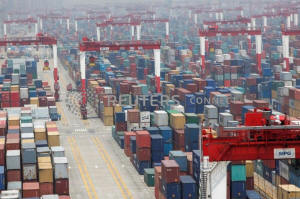|
Next year, China will implement temporary import tariffs, which
are lower than the most-favored-nation tariffs, on more than 850
products, the finance ministry said on Monday. That compared
with 706 products that were taxed at temporary rates in 2019.
The tariff changes were made to "increase imports of products
facing a relative domestic shortage, or foreign specialty goods
for everyday consumption," the ministry said in a statement on
its website.
China and the United States cooled their drawn-out trade war
earlier this month, announcing a Phase 1 agreement that would
reduce some U.S. tariffs in exchange for more Chinese purchases
of American farm products and other goods.
The finance ministry said the tariff rate for frozen pork will
be cut to 8% from the most-favored-nation duty of 12%, as China
copes to plug a huge supply gap after a severe pig disease
decimated its hog herd.
An outbreak of African swine fever that started in August last
year has nearly halved China's pig herd, official data showed,
sending pork prices soaring to record levels.
Beijing has issued a series of measures to boost pig production,
while increasing imports of various meats to meet domestic
demand.
China brought in 229,707 tonnes of pork in November, up more
than 150% from the previous year. Pork imports for the first 11
months of the year stood at 1.733 million tonnes, up 58% from a
year earlier.
China will also lower temporary import tariffs for ferroniobium
- used as an additive to high strength low alloy steel and
stainless steel for oil and gas pipelines, cars and trucks -
from 1% to zero in 2020 to support its high-tech development.
The country brought in 35,909 tonnes of ferroniobium in 2018 and
37,818 tonnes for the first 10 months of this year.
The tariff rate for frozen avocado was cut to 7% from the
most-favored-nation duty of 30%, the ministry said.
China's economy is expanding at its weakest rate in nearly 30
years and could face more downward pressure next year, but the
government has vowed to keep growth within a reasonable range in
2020 and keep policies forward-looking and effective.
U.S. Trade Representative Robert Lighthizer said China had
agreed to buy $200 billion worth of additional U.S. goods and
services over the next two years as part of the Phase 1 trade
pact to be signed in early January. If the purchases are made,
they would represent a huge jump in U.S. exports to China.
Beijing has said the increased purchases are in line with the
growing need of the Chinese people, as the country opens its
markets further to global trade.
Tariffs for some asthma and diabetes medications will be set at
zero, the ministry said, while duties on some wood and paper
products will be lowered too.
Import tariffs on multi-component semiconductors will be cut to
zero.
China will also further lower most-favored-nation import tariffs
on some information technology products from July 1, the
ministry said.
(Reporting by Lusha Zhang, Stella Qiu, Hallie Gu, and Min Zhang,
and Ryan Woo; Editing by Christopher Cushing and Jacqueline
Wong)
[© 2019 Thomson Reuters. All rights
reserved.] Copyright 2019 Reuters. All rights reserved. This material may not be published,
broadcast, rewritten or redistributed.
Thompson Reuters is solely responsible for this content.

|
|






